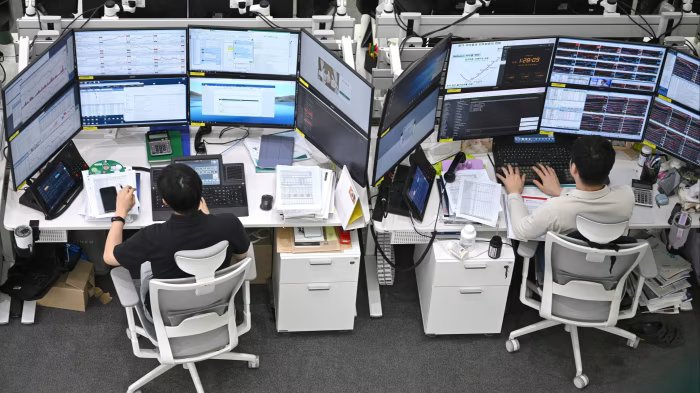Unlock the Editor’s Digest for free
Roula Khalaf, Editor of the FT, selects her favourite stories in this weekly newsletter.
South Korea’s Kospi has gained more than 66 per cent this year, making it the world’s top-performing major stock index by far, as it rides a wave of enthusiasm for artificial intelligence and corporate governance reforms.
The Kospi has outperformed Wall Street’s S&P 500 by 49 percentage points this year, the widest margin in two decades, driven by a rise in foreign investment flows and AI boosting the country’s biggest stocks, notably its chipmakers.
The rally is a remarkable turnaround for South Korea’s market. For much of the past three years, the Kospi traded below a price-to-book ratio of one, meaning most investors thought the stocks were worth less than the companies’ assets.
But investors are reconsidering the country.
“It’s an overall re-rating of the Korean market,” said Albert Saporta, group chief executive of asset manager GAM. “The Korean market was incredibly cheap before this rally.”
Analysts have attributed the bull run to bets on AI, corporate governance reforms and booming exports from manufacturers in critical supply chains.
Artificial intelligence
The Kospi’s rise has been buoyed by its two largest constituents — Samsung Electronics and SK Hynix — which together comprise almost 30 per cent of the index.
Samsung shares have jumped more than 90 per cent this year and SK Hynix has tripled as the companies benefit from AI-driven demand for their semiconductors, particularly high-bandwidth memory products.
Joshua Crabb, head of Asia-Pacific equities at Robeco, said the high valuations of US technology groups had left investors asking: “If that valuation is right, what else in the supply chain is relatively undervalued?”
Samsung, the world’s largest memory chipmaker, said its operating profit in the July-September quarter rose more than 30 per cent year on year to a three-year high, while SK Hynix is expected to report robust quarterly earnings on Wednesday.
The two companies signed a deal with OpenAI this month to supply semiconductors for the ChatGPT maker’s $500bn Stargate data centre project.

Corporate governance reform
A push by the South Korean government to improve stock market valuations and governance in the country’s family-controlled conglomerates has also attracted foreign investors.
The government was “following a mix of what Japan did 10 years ago along with some tax reform”, said Saporta, referring to Japan’s corporate governance reforms, which have boosted the Topix and Nikkei 225 indices. “That’s getting investors excited.”
In July, South Korea amended its commercial code to make explicit directors’ duty to shareholders. It is now preparing to cut dividend taxes, and the ruling party has submitted a bill mandating companies to cancel their own treasury shares.
The measures, if implemented, would be another catalyst for the Kospi, analysts said, and could help end what has long been perceived as mistreatment of minority shareholders by majority owners. Expectations for the measures have driven up shares of conglomerates and financial groups with large treasury holdings.
The return of foreign investors
After being net sellers of South Korean stocks in the first half of the year, foreign investors are now net buyers, purchasing Won2tn ($1.4bn) worth of equities this year.
Jongmin Shim, Korea equity strategist at CLSA, said he expected inflows to continue as foreign net buying was still lower than in the middle of 2024.
Despite the stellar performance, South Korea’s momentum-driven retail investors have been largely absent from this year’s record-breaking rally.
“The net purchases are mostly coming from the foreigners and domestic institutions,” Shim said. “Once we see a further rally of the Kospi then retail money will come back and push up the market further. That’s the time I would be getting worried about the market.”

South Korean manufacturers
This year’s rally has also been buoyed by South Korean manufacturers operating in critical sectors such as defence, shipbuilding and batteries.
Shares of Hanwha Aerospace, South Korea’s largest defence manufacturer, and HD Hyundai Heavy Industries, the country’s largest shipbuilder, have risen 296 per cent and 116 per cent, respectively.
South Korea has emerged as one of the world’s top 10 defence exporters since the war in Ukraine began. Investors expect it to benefit from the western drive to re-arm because of the country’s cost-competitive manufacturing base.
They also expect South Korean shipbuilders to play a key role in US efforts to revive its naval force to keep pace with China.
Battery makers have been bolstered by AI-driven demand for energy storage facilities and growing optimism for the electric-vehicle sales outlook.
Shares of LG Energy Solution, the world’s third-largest battery producer, have jumped more than 40 per cent this month. The company is making inroads in the US energy storage market because of rising demand for power from AI servers while Chinese rivals have been hit by US trade policies.
Investor sentiment has also been boosted by heightened expectations of a trade deal with the US, ahead of President Donald Trump’s planned meeting with his South Korean counterpart Lee Jae Myung on Wednesday.
Additional reporting by Haohsiang Ko in Hong Kong


